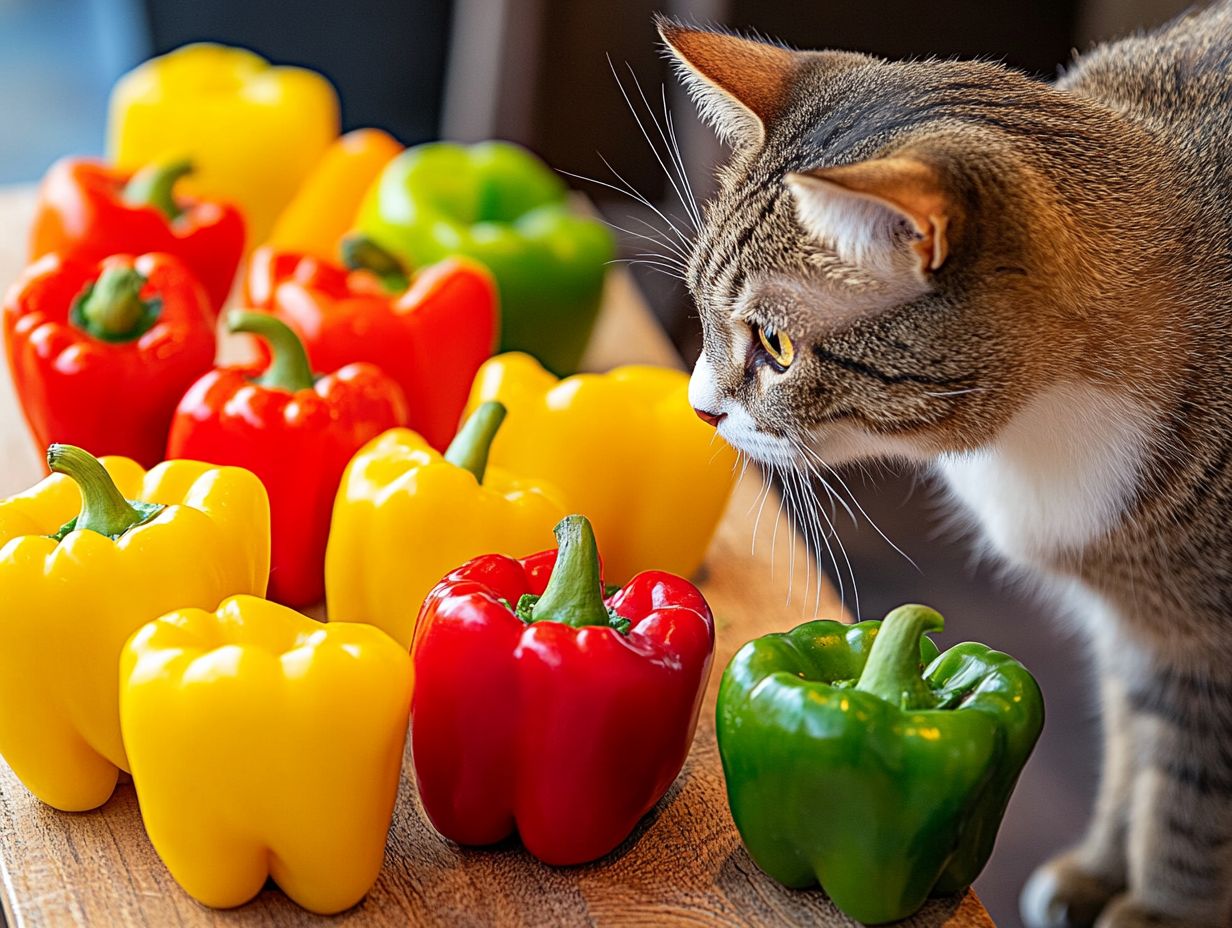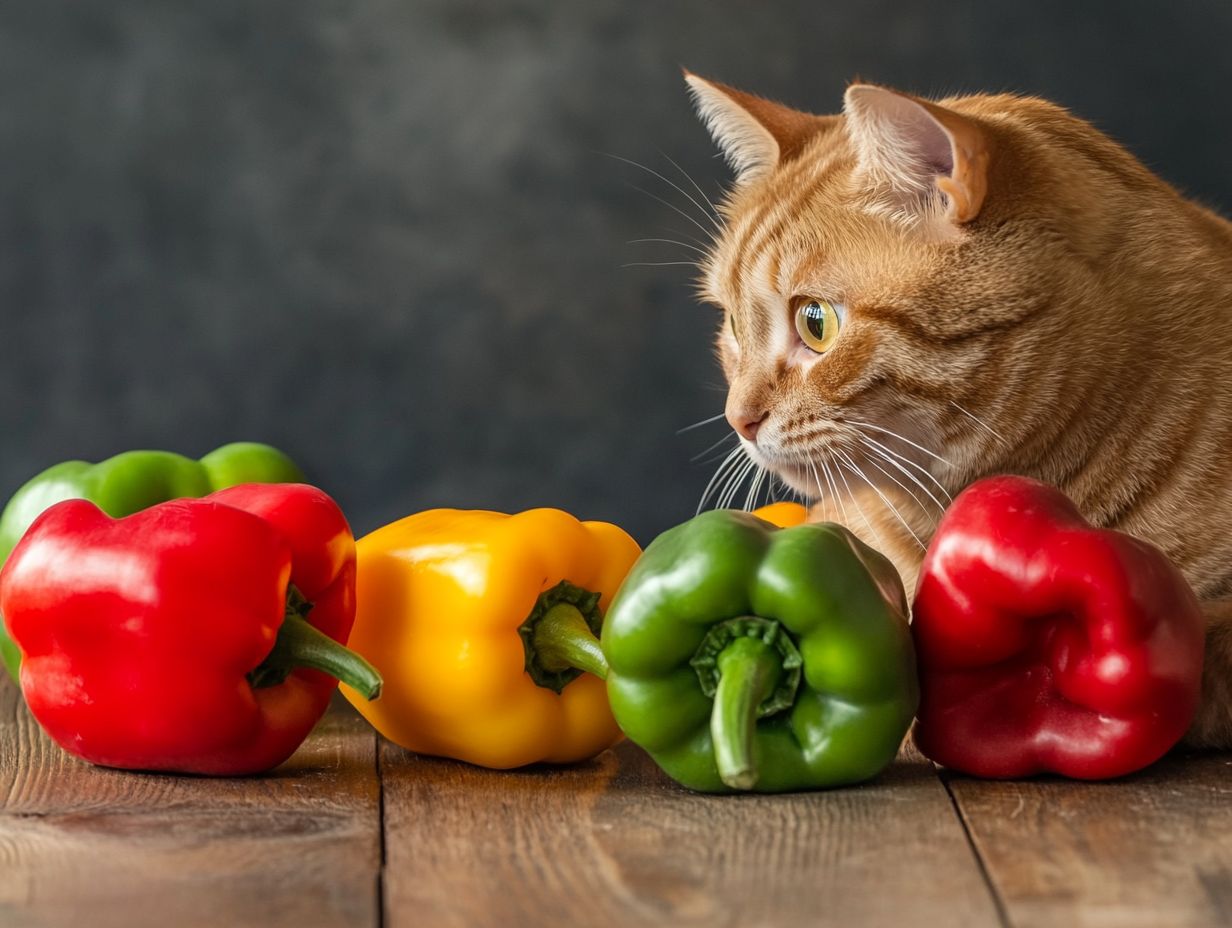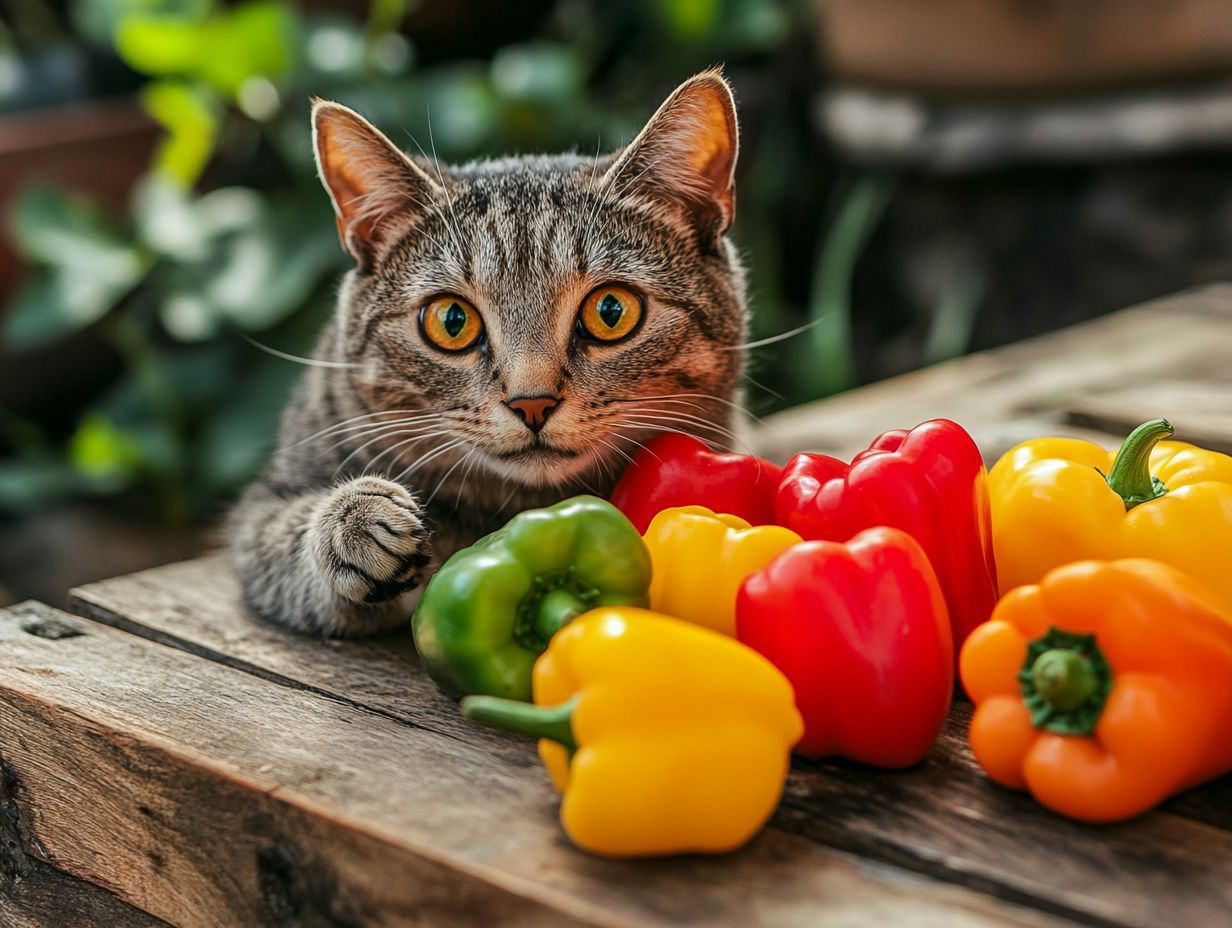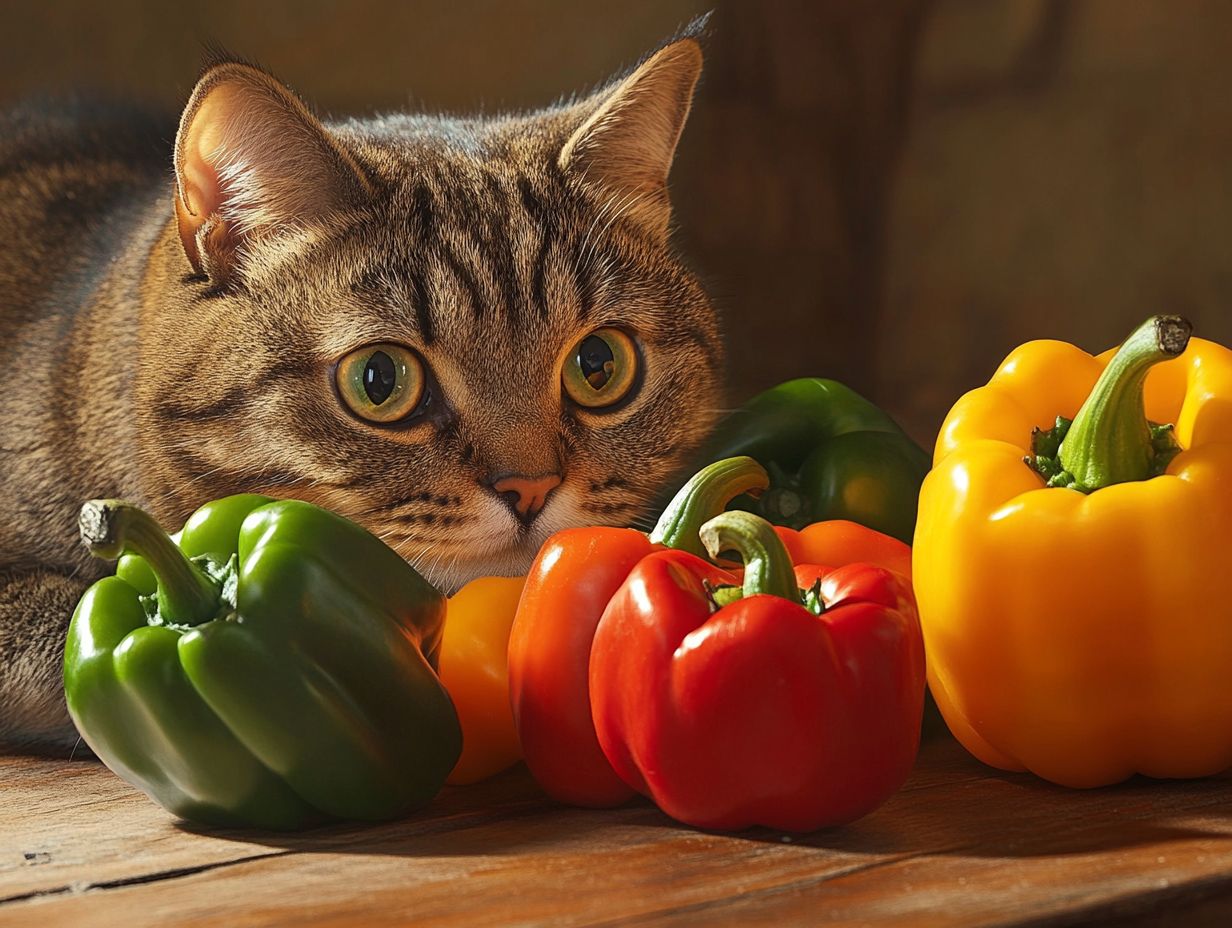Curious about whether bell peppers are a safe snack for your feline friend? This article explores the nutritional profile of bell peppers, their benefits, and potential risks when introducing them into your cat’s diet.
We will cover how to safely incorporate this colorful veggie into your cat’s meals as an occasional treat, along with guidelines for proper preparation and alternatives if bell peppers aren’t the best fit for your pet’s nutritional needs.
Join us to better understand what’s safe and healthy for your beloved pet, focusing on healthy snacks that align with their dietary requirements!
Key Takeaways:

- Cats can safely consume bell peppers in moderation, but they are not a necessary part of their diet.
- While bell peppers offer some nutritional benefits, such as vitamins A, C, and E, they should not replace the primary source of animal protein in a cat’s diet.
- When incorporating bell peppers, always prepare them properly and offer small portions, like a teaspoon of chopped bell pepper, as occasional treats.
Overview of Cats and Bell Peppers
Bell peppers are vibrant vegetables that come in red, green, and yellow varieties. Cats are naturally curious creatures and often enjoy exploring the foods their owners eat. Many pet owners wonder whether cats can eat bell peppers as a treat.
The answer is yes; bell peppers can be safely fed to cats in moderation. They are not toxic to cats and offer some nutritional benefits, including vitamin C and beta carotene, making them a suitable occasional treat for healthy felines when given in small amounts.
Can Cats Safely Consume Bell Peppers?
Many pet owners worry about whether their feline companions can safely consume bell peppers, making it essential to address these concerns thoroughly. Understanding cats’ dietary needs and potential allergic reactions is crucial, as their digestive systems differ significantly from those of humans.
Fortunately, bell peppers are not toxic to cats and can be offered in small portions. However, it is imperative for guardians to seek veterinary advice, possibly even using an online vet service, before introducing any new food into their cat’s diet. There may be risks of allergic reactions, which can manifest as vomiting, diarrhea, or itching. Always consult your veterinarian for tailored guidance based on each individual cat’s health needs.
Nutritional Value of Bell Peppers for Cats
Bell peppers are colorful and nutritious foods that can serve as an occasional snack for cats. Rich in vitamin C, beta carotene, and vitamin E, they contribute to the overall health and wellness of your feline friend.
Although cats primarily require animal protein in their diets, the vitamins, such as vitamin A, C, and E, along with indigestible fiber found in bell peppers, can offer additional health benefits when provided in small amounts.
Benefits of Bell Peppers for Cats

- Supports immune function through high vitamin content.
- Contributes to healthy skin, aiding in a shiny coat and bright eyes.
- High fiber content aids digestion by promoting regularity and preventing constipation.
Potential Risks of Feeding Bell Peppers to Cats
Bell peppers can pose risks to cats. The potential dangers of bell pepper consumption for felines include:
- Digestive issues if consumed in large quantities.
- Signs of allergic reactions such as vomiting, diarrhea, and itching. Warning: Monitor your cat closely for any adverse reactions when introducing bell peppers.
Safety Guidelines for Feeding Bell Peppers to Cats
To safely feed bell peppers to your cat:
- Remove seeds and stems before offering.
- Consider cooking the peppers (e.g., steam for a few minutes) if your cat is sensitive to raw vegetables.
- Introduce bell peppers gradually and monitor for any signs of digestive distress.
Conclusion
In summary, bell peppers can be a safe and healthy occasional treat for your cat when introduced properly. Remember to offer them in moderation, consult your veterinarian for personalized advice, and always observe your feline friend for any adverse reactions.
- Digestive Disturbance: Bell peppers may cause gas or upset stomach in cats, regardless of their enjoyment of the taste.
- Choking or Obstruction: Bell peppers can be a choking hazard for cats. If they are not cut into small pieces, they may cause an obstruction in a cat’s throat or digestive tract.
- Sensitivity or Allergic Reactions: Some cats may have sensitivities or allergic reactions to bell peppers, leading to digestive disturbances or more serious health issues. It is crucial to consult a veterinarian for personalized advice.
Due to these risks, it is advisable to offer bell peppers to cats in moderation, carefully monitoring their reactions and consulting a veterinarian or online vet before implementing any significant dietary changes.
Benefits of Bell Peppers
When offered in moderation, bell peppers can provide some nutritional benefits for cats. They are low in calories and rich in vitamins, contributing to a balanced diet while being a colorful addition to their meals.
How to Incorporate Bell Peppers into Your Cat’s Diet
Feeding bell peppers to cats is a straightforward process that can be enjoyable for both the pet and the owner. By offering bell peppers in small amounts, you can provide the nutritional benefits without overwhelming your cat’s digestive system. For more information, check out Can Cats Eat Bell Peppers? What You Need to Know.
Preparing Bell Peppers for Cats
Preparing bell peppers for your cat is simple and can be a healthy addition to their diet when done correctly. Fresh bell peppers are crunchy and hydrating, while cooked bell peppers may be easier for some pets to digest. Always deseed and remove the stem before feeding.
Whether you choose to serve them raw or cooked, always cut the bell peppers into small, manageable pieces (e.g., no larger than a pea) to prevent choking hazards. It’s also important to supervise your cat while they eat, as they can become overly excited, which is common among curious pets.
Pet safety is a priority, so make sure your cat does not have access to the seeds or the bell pepper’s stem, as these can be harmful. Additionally, remember to introduce new foods gradually to observe how your cat reacts.
Recommended Serving Sizes

Understanding the recommended serving sizes of bell peppers for cats is essential for their health and safety when introducing these vegetables into their diets. Cats are obligate carnivores (meaning their dietary needs primarily consist of protein sources like meat). Therefore, any addition of bell peppers should be made in moderation.
A piece no larger than a dime, offered in small amounts—no more than 10% of their daily caloric intake—can serve as a fun treat without compromising their essential nutrition. Incorporating these colorful vegetables with high-quality cat food ensures that your cat receives the necessary nutrients for optimal health.
As always, it is advisable to consult a veterinarian before making any significant dietary changes.
Alternatives to Bell Peppers for Cats
While bell peppers are a healthy option for cats, there are many other alternatives to consider for their diet.
Other Healthy Foods for Cats
- Carrots: Rich in beta-carotene, supporting vision and immune health.
- Peas: Provide protein and fiber, promoting digestion and delivering sustained energy.
- Blueberries: Offer vitamins and hydration without excess calories.
- Watermelon: A hydrating, low-calorie treat.
Incorporating a variety of colorful vegetables can enhance the overall nutrition of your cat’s meals. These snacks can serve as delightful treats while supplying beneficial nutrients, keeping your cat safe and healthy without compromising their wellbeing.
Substitutes for Bell Peppers in Your Cat’s Diet
The best substitutes for bell peppers for cats are vegetables rich in vitamins, providing health benefits without causing digestive issues. Carrots, peas, and zucchini make excellent alternatives, offering additional advantages through their fiber and vitamin content, which can support digestion and overall health.
Conclusion
In summary, bell peppers can be offered to cats in moderation, highlighting the importance of careful preparation, serving sizes, and consultation with a veterinarian. By understanding the benefits and potential risks, cat owners can make informed decisions regarding their pet’s diet while ensuring their health and safety.
Frequently Asked Questions

Can cats safely eat bell peppers?
Yes, cats can safely eat bell peppers as they are not toxic to them. However, they should only be given as an occasional treat and not as a staple in their diet.
What are the benefits of feeding bell peppers to cats?
Bell peppers are a good source of vitamins A and C, as well as dietary fiber, which can help improve digestion in cats.
Can bell peppers be harmful to cats?
While bell peppers are generally safe for cats to eat, they can cause stomach upset if given in large quantities. It’s best to start with small amounts and monitor your cat’s reaction before giving more.
Are there other vegetables safe for cats?
Yes, other safe vegetables include carrots, peas, and zucchini. Always ensure they are prepared properly and introduced gradually.